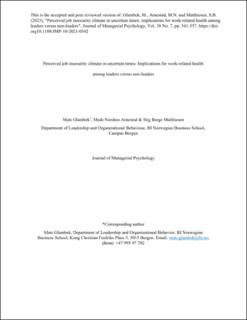Perceived job insecurity climate in uncertain times: implications for work-related health among leaders versus non-leaders
Journal article, Peer reviewed
Accepted version
Permanent lenke
https://hdl.handle.net/11250/3108781Utgivelsesdato
2023Metadata
Vis full innførselSamlinger
Sammendrag
Purpose
Previous studies have demonstrated that perceived job insecurity climate denotes an individual-level stressor. The present study reiterated this notion and investigated whether leadership responsibility moderated the association between perceived job insecurity climate and work-related strain about one year into the coronavirus disease (COVID-19) pandemic.
Design/methodology/approach
A sample of full-time workers (N = 1,399) in the USA was recruited, comprising 663 leaders and 763 non-leaders. Employing a cross-sectional design, the authors hypothesized that perceived job insecurity climate would be associated with work-related strain (i.e. burnout, absenteeism and presenteeism) and that these associations were stronger for employees with leadership responsibilities compared to non-leaders.
Findings
Findings revealed main effects of perceived job insecurity climate on burnout but not on absenteeism or presenteeism. Furthermore, leadership responsibility moderated the associations between perceived job insecurity climate and two out of three burnout measures in the hypothesized direction. The findings also revealed interaction effects regarding absenteeism and presenteeism, indicating that these associations are only positive and significant for employees with leadership responsibilities.
Practical implications
Perceptions of widespread job insecurity engender strain among leaders while simultaneously implying a heightened need for effective leadership. Organizations and practitioners should take the present findings into consideration when implementing preventive and restorative measures to address leaders' health and organizational competitiveness when job insecurity increases.
Originality/value
This study found that, as an individual stressor, perceived job insecurity climate is more detrimental to employees with leadership responsibility than to non-leaders.
